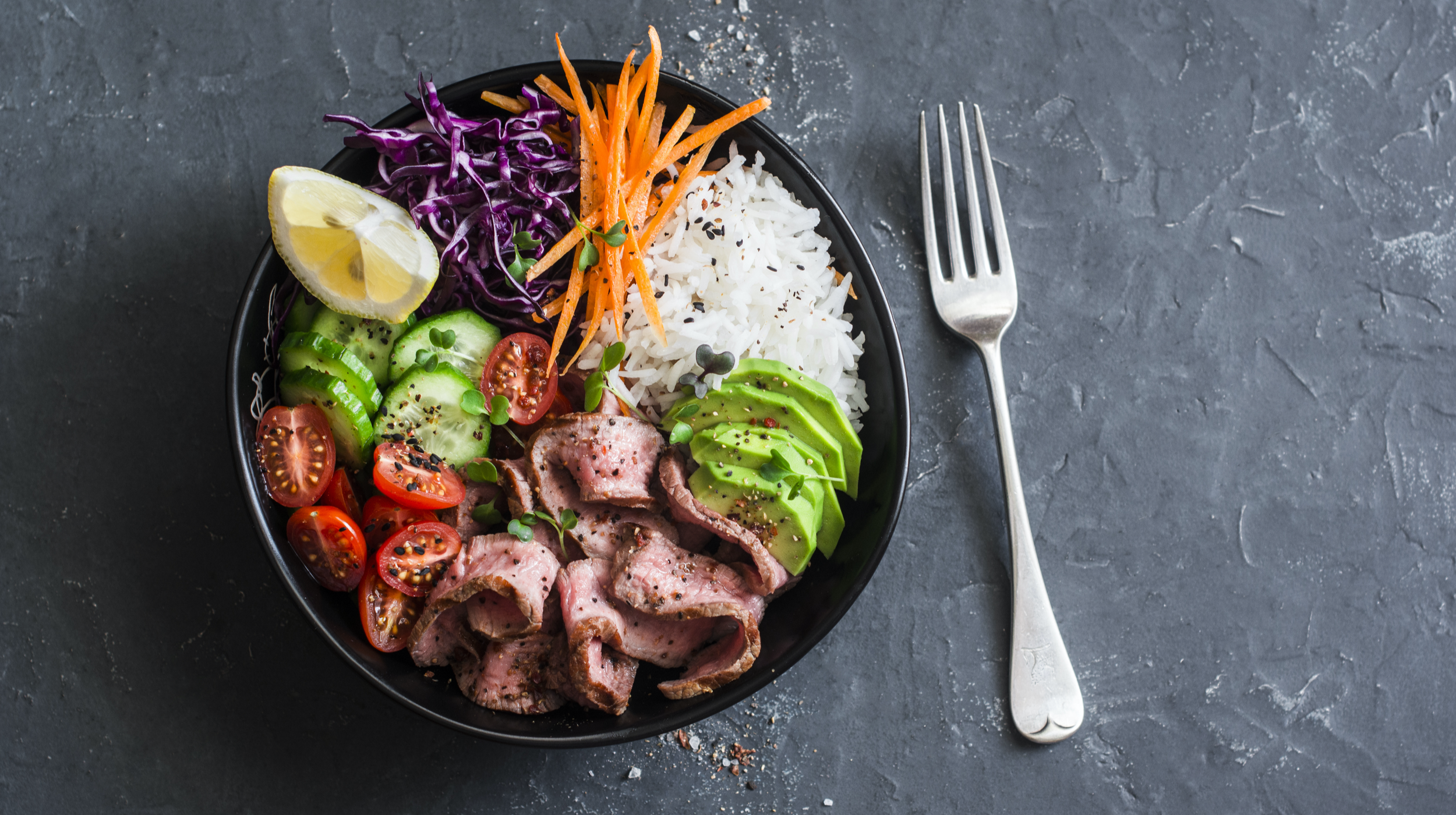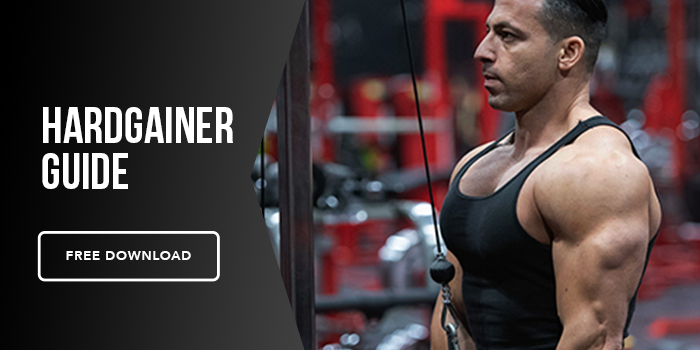Nutrition is essential for hardgainers who find themselves struggling to gain weight, no matter what they eat. Hardgainers need to eat more than they think they do, much more! Most hardgainers under consume calories from foods which lack nutrients, and they don't realize this until they take a closer look. If you think you are eating enough to put on weight and gain muscle, you most likely are actually eating far less and often lacking consistency with your nutrition. Just like any goal, it's crucial to develop a regimen you can stick to and build upon as your training and nutrition progress.
How much should you eat?
"You have to EAT BIG to GET BIG." We have all heard this, but it is not true when shared within the hardgainer community. Yes, you have to be in a caloric surplus, but if you want to build lean mass and not just mass in general, it's important to eat the right amount of nutrient-dense foods that will help you build muscle. If you over consume by eating a lot of junk food, you will gain fat mass along with any muscle gains (1). Eating anywhere from 15 to 25% more calories than you burn everyday primes your body for muscle gain, putting yourself in a healthy surplus for a hardgainer. You can slowly increase your surplus or modify depending on how your body responds.
It's also critical to know that once you begin to eat more, your metabolism starts to speed up, encouraging your body to burn more calories. This is extremely important when it comes to choosing the right foods, as hardgainers adapt to eating higher amounts of calories than others. Some hardgainers can even eat an additional 500-1000 calories more than what they burn to see muscle gains. It can be a very frustrating process, but be patient and keep up with tracking your food and your workouts.
That being said, it's essential to know where you are currently with your daily calorie intake and macronutrients by tracking what you eat. Once you have begun tracking, a steady rule of thumb to build your daily diet around is to have roughly 80% of the foods come from whole food sources, and the remainder can be higher calorie options to help you eat more throughout the day.
Before we get into what a hardgainer diet looks like, let's clarify some basics. A calorie is a way to measure energy, so calories represent units of energy. In technical terms, a calorie (or, when accurately used to describe the calories in food, a kilocalorie) is the amount of energy needed to raise the temperature of a kilogram of water by one degree Celsius.
Food is vital to providing the body energy for necessary functions such as breathing and physical activity. You get calories from essential macronutrients like protein, carbohydrates, and fat. While some foods such as broccoli provide few calories per gram, other foods like ice cream provide numerous calories. Breaking down the three macronutrients, we have carbohydrates and protein that provide four calories per gram, while fat contains nine calories per gram. Once consumed, the food you eat must be digested and metabolized to release the energy that can be used to fuel your body. Everyone is different with macronutrient ratios, and manipulating them can help you gain muscle or fat and affect your digestion and performance in the gym.
Macronutrients for the Hardgainer
"The more protein you consume, the better it is for building muscle." Many supplement companies claim you need to consume an outrageous amount of protein to build muscle. Not true! Studies show to keep your protein goal at 0.7-1g per pound of body weight, as it aids your body in building muscle (2). For hardgainers, you can boost this to 1g per pound of body weight, but that's it! You don't have to overdo it. To maximize an anabolic response and build muscle, you need roughly 20-40g of protein per meal (2). Too much protein will only fill you up and not help you any further towards muscle gains. Out of the three macronutrients, protein is very satiating, and eating more than you need won't help you keep up with the calorie goal you're trying to achieve. (3)
It's important to utilize more carbs and fats to boost calorie intake as well. Eating carbs also helps to stimulate your appetite and can help you reach your caloric goal. We all know how easy it is to eat a bowl of pasta rather than a bowl of chicken. There is only so much protein and fat you can consume without feeling full and not wanting to eat anything else. But, some people are sensitive to certain carbohydrates when it comes to digestion. If so, it's essential to experiment with various carb sources from whole foods such as rice, grains, potatoes, and fruit.
Carbohydrates are extremely important to consume for fueling your muscles, as well as aiding in muscle growth (4). Consuming carbs helps you have the energy you need to increase strength, power, and endurance in your workouts, which results in building muscle. Once consumed, carbs are partially converted to glycogen which is stored in your muscles and liver, and then used for energy in your workouts (5).
Fats can be an easy tool to add more calories to your shakes and snacks throughout the day and can make up 15-30% of your calories. Healthy fats are not something to be afraid of, especially for the hardgainer, as they are also essential for overall health. Fats facilitate the absorption of fat-soluble micronutrients such as vitamins A, D, E, and K, all of which have a role in building and maintaining muscle. Fats, including small amounts of saturated fats, also help maintain optimal cell structure and hormone levels. These are crucial for supporting a muscle-building environment for the hardgainer (6).
Omega-3 fatty acids have been shown to increase muscle protein synthesis, which is the process your body goes through when it turns the protein you eat into the energy your muscles need to grow and build strength. As a hardgainer, you want to focus on healthy fats through whole food sources such as nuts, eggs, avocados, fish, and natural oils.
Your diet can adapt and change as you progress in your workouts and caloric demands. Remember that you need to be in a caloric surplus, with the right foods to gain muscle and strength. Having sufficient amounts of protein, fats, and carbs sourced from mostly whole food sources will be your foundation as you manipulate and progress your amounts of each for your individual body.
1) https://pubmed.ncbi.nlm.nih.gov/23679146/
2) https://pubmed.ncbi.nlm.nih.gov/28698222/
3) https://academic.oup.com/ajcn/article/82/1/1/4863302
4) https://www.ncbi.nlm.nih.gov/pmc/articles/PMC4033492/
5) https://www.ncbi.nlm.nih.gov/pmc/articles/PMC6019055/
6) https://www.ncbi.nlm.nih.gov/pmc/articles/PMC3499967/






